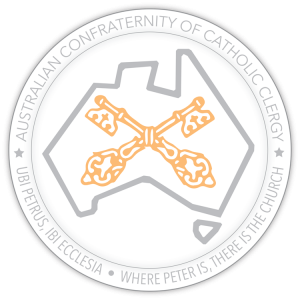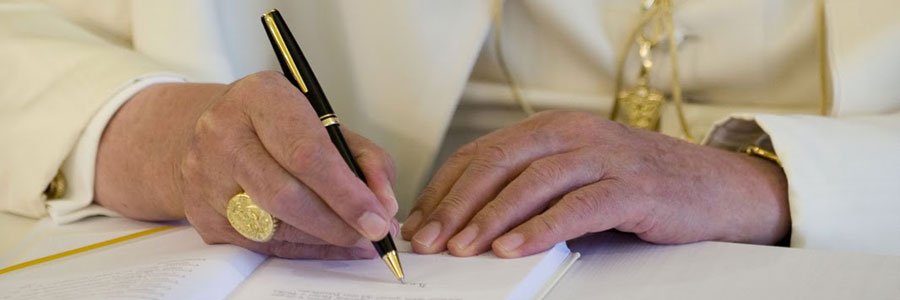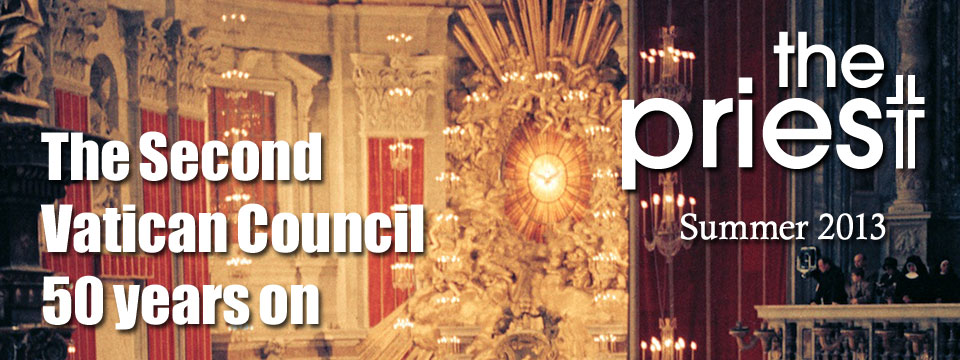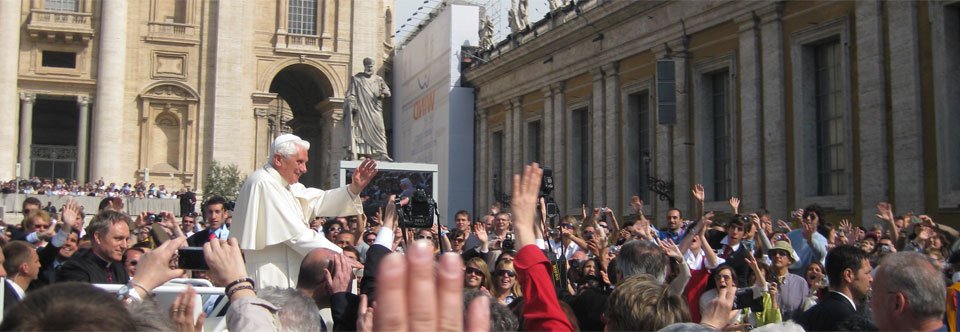This long encyclical is not an easy read and from a social science perspective some of the analysis may be questioned. It is important to discern the “heartland” of this encyclical. What is the enduring contribution of this encyclical? Where does this encyclical most astutely analyse the human malaise that is manifest in yet another failure in market, political, and social orders both national, international, and global? It is where the Pope speaks “theologically”, rather than presenting an economic, political, or social understanding. And the heart of his theological speaking is this: the created order has its own “logic” and this logic is love in truth, Caritas in Veritate.
This “logic” does not arise from the created order in-andof-itself, but from the One who created this order. Thus, the love and truth inherent in the created order are theological: the “logic” is from the Theos (God) who created and who sustains the universe. Particularly in its human aspect, love and truth are not “from man”; love and truth are not, so to speak, “human constructions”, nor do they arise from human subjectivity. Rather, love and truth are inherent in the created order (and thus in the human order) because they are inherent in God’s work of creation. As such, they are God’s gift. They are “of God”, not “of man”. Yet, however, it is in the nature of God’s action in the world that man is to discover truth and to enact it in love. This is the human enterprise: to live in love and truth.
Pope Benedict’s forceful confronting of our contemporary world is not in the acuteness of his analysis of economic, political and social spheres. It is in the acuteness of his presenting love and truth as being inherent in the destiny of man where love and truth are understood firstly “theologically”, and then secondarily and rightly as “human”. The contemporary challenge is to recognise this objectivity both personally, socially, and globally. It is this recognition that will guide and energise the personal, social, and global construction of life and outcomes that are just, iustus.
This “heartland” of the encyclical is introduced at #21, where the Holy Father addresses cultural renewal for a world that needs to “rediscover fundamental values”. The words “rediscover” and “fundamental” are crucial. The Pope wants his readers to understand that there is a fundamental ordering of economic, political, and social affairs that has its own nature. He amplifies (#51) using the language of “human ecology” as an analogy with “environmental ecology” to appeal to an understanding that, as the physical environment has its own principles of ordering, so too does the human environment. And these principles of ordering are not “made”; they are given, and thus “discovered”. It is this “discovery” (or “re-discovery”) that provides the key to “integral human development”. Without this discovery, we may have growth and change; but it may simply be enlargement and decay, and not properly “development” (#29). A truly human development involves discovering a meaning that is not of our making” (#70), but is given, is “gift”:
It is from this “discovery” that the Holy Father then suggests the unfolding of institutional means and processes that implement truth and love and that give rise to “integral human development” (#30,51). In a global world the Holy Father envisages these institutions as global, international, national, local, and personal; as economic, political and social. In brief, he argues for institutional development that is not segmented between, for example, the international and the national, or between the economic and the social (#41).
Truth and love … cannot be produced: they can only be received as a gift. Their ultimate source is not, and cannot be, mankind, but God, who is himself Truth and Love. (#52)
This comprehensive aspiration for institutional development is however not an imperial model, but a participatory model. In language taken from his predecessors, it is an institutional development that captures the principles of “subsidiarity” and of “solidarity” (#41,47,49,57,58,67). Decisions are not made simply from “above”: nations participate in the structuring and functioning of global institutions while retaining the institutional structuring and functioning that is proper to each nation; the social groupings that form each nation participate in the structuring and functioning of national institutions while retaining the institutional structuring and functioning that is proper to each social grouping. This particularly applies to the basic “social group”, the family: the family retains the institutional structuring and functioning that is proper to the family and retains this as an application of the principle of subsidiarity. And likewise with the person: it is fundamental human rights that are retained by the individual in part as an application of the principle of subsidiarity.
This perspective is reinforced by the principle of “solidarity”: one nation is not simply isolated from another nation; nor one social group from another; nor one person from another person or other persons. There is a commonality of interest, of concern, and of action that is an application of the principle of solidarity.
These principles of subsidiarity and of solidarity are also captured in institutional configuration and functioning as applied to perspectives that are economic, political, and social. The “economy” has its own proper “subsidiarity” and its own inherent structuring and governance; the “political order” has its own proper “subsidiarity”; the “social order” has its own inherent “subsidiarity”. But none of these is simply “autonomy”: the market is not simply a law unto itself; the state is not simply a law unto itself; society is not simply a law unto itself. There is an inter-penetration that does not admit a “binary divide” between the market and the state; between the political order and the family; or between any of these and the person (and, of course, between person and person also): there is a solidarity in the application of subsidiarity. All this, however, involves “discovery”, and discovery of what is there of “gift”.
Interestingly, Pope Benedict XVI does not use a term coined in the social encyclicals of his venerable predecessor: “economistic” (Laborem exercens, 1981, #13). In using this term, Pope John Paul II was addressing a world-view where economic value and utility were supreme and where subjectivity in valuation was taken as a given. While not using this language, Pope Benedict XVI addresses the same issue. When he says “the notion of ‘efficiency’ is not value-free” (#50), he is challenging a paradigm that evaluates outcomes in terms of maximising utility outcomes in relation to resource inputs, where both outcomes and inputs are priced in an autonomously operating market. Pope Benedict XVI, like his predecessor(s) is saying, “No!”: a market is not “efficient” simply because it produces “more” using “less”; value-adding is not viably assessed simply upon such input-output relations. Rather, there are values that are inherent in the nature of things. The created order is not simply there for our arbitrary exploitation according to subjective market valuation; and certainly persons are not simply there for exploitation according to others’ subjective valuation (#66). There is an objectivity in the created order, and this objectivity is “moral”. That is, there is an objective moral order, and institutional functioning and outcomes do not stand apart from this moral objectivity of valuation.
The implementation of this objective morality is predicated upon subjects who are capable of generating objectively moral outcomes. They do not just “happen”; they happen because they are generated by persons who adhere to a morality that is not simply created by them, but that “is” (#35). The Holy Father gives considerable attention to institutional configuration and functioning and some of this analysis may be questioned. He nevertheless makes clear that “… it is not the instrument [institution] that must be called to account, but the individuals [in] their moral conscience and their personal and social responsibility” (#36 & 71,72). This underlying morality must be grounded on the doctrine of the Church, which is “datum” giving the transcendent value of natural moral norms (#45). For Benedict XVI, the “book of nature” is not simply “natural”, but also is “transcendent” and finds its origin and its end in God himself (#52). His appeal ultimately is to the classical (“not new”) theological understanding of “natural law” (#59).
Pope Benedict XVI thus challenges our present era to see that the big issues are not firstly or simply “how” not simply technical questions such as how to adapt institutional governance to respond to global financial difficulties. But also “why” issues issues that involve the discovery of meaning, and meaning not of our own making (#70). He argues, “When technology is allowed to take over, the result is a confusion between ends and means, such that the sole criterion for action in business is thought to be the maximisation of profit, in politics the consolidation of power, and in science the findings of research.” He thus asserts, “Both professional competence and moral consistency are necessary” (#71). The Pope says, “What is astonishing is the arbitrary and selective determination of what is put forward today as worthy of respect” (#75). What he urges is that people should afresh be “surprised” (#77) at the (re-) discovery of the integral nature of the natural order and of the human order, and of the integrity of body, soul, and spirit in the human order (#74,76). It is this (re-)discovery and adherence to what is discovered that brings “integral human development” (#78).
This integral human development is a manifestation of charity and truth that springs from what is in the nature of things and in the nature of man and that begins in and leads to God. Life essentially is theological, and morality “ethics” is essentially theological. The encyclical “in simple” is a call for a contemporary rediscovery of love in truth, Caritas in veritate.






